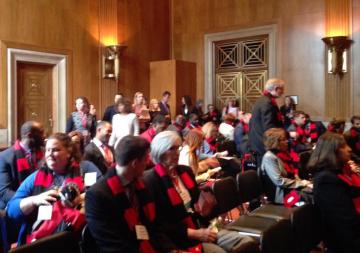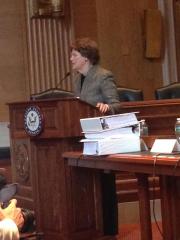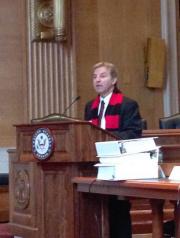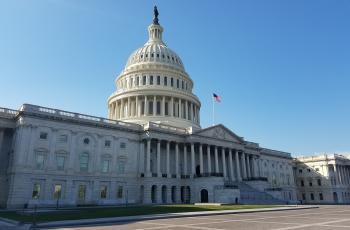At 2017 ADA Call to Congress, Senators Across the Aisle Advocate for Affordable Healthcare & Continued Diabetes Research Funding
Over 180 advocates, researchers, healthcare providers, and NFL “Team Tackle” members seeking to raise diabetes awareness gathered in the US Capitol yesterday for the American Diabetes Association’s 2017 Call to Congress.

After a press conference, advocates representing 33 states attended more than 188 meetings (by the last tally) with Senate and House members to press their concerns on behalf of the 30 million Americans living with diabetes and the 86 million more estimated to have prediabetes.
The 2017 Call to Congress follows accusations of collusion over insulin pricing, a concern most prominently raised by Senator Bernie Sanders last fall and held by many advocates and healthcare providers across the country. It also comes only days after the announcement of proposed expansive NIH cuts – totaling $1.2 billion – that target research grants critical to advancing the care and a cure for diabetes. And it comes at a time when issues of healthcare access and affordability are in the spotlight. The Republican House Speaker, Paul Ryan, pulled the American Health Care Act from the House floor just minutes ahead of a scheduled vote last week. According to estimates, 24 million Americans would have lost their healthcare coverage, especially older citizens most affected by diabetes and its complications.

Thursday’s Call to Congress began with an ADA press conference at the US Senate. The moving panel of speakers included: Kevin L. Hagan, CEO of the ADA; Dr. William T. Cefalu, Chief Scientific, Medical & Mission Officer of the ADA; Dr. LaShawn McIver, Senior VP of Advocacy at the ADA; Senator Jeanne Shaheen (D-NH), Co-Chair of the Senate Diabetes Caucus; Senator Susan M. Collins, (R-ME), Co-Chair of the Senate Diabetes Caucus; Dr. George King, Chief Scientific Officer of Joslin Diabetes Center at Harvard Medical School; Kyle Love, a defensive tackle for the Carolina Panthers football team and member of Team Tackle; Kathy Sego, advocate and mother; and Liz Kennett, a certified diabetes nurse educator and advocate.
Senators Susan M. Collins (R-ME) and Jeanne Shaheen (D-NH) took center stage to affirm their staunch commitment to continued access to affordable healthcare and diabetes treatment options for all; they also affirmed the need for continued federal funding for critical diabetes research. The ADA’s Senior VP of Advocacy, Dr. LaShawn McIver, said that the Affordable Care Act (ACA) is not perfect, but that it has made great strides in helping protect people with chronic conditions. She said that the ACA should only be repealed and replaced with something that ensures equal or greater protections for people with diabetes. Indeed, we’d love to see the ACA built upon and improved, particularly in terms of deductibles and co-pays.

The ADA presented Senators Collins and Shaheen, the co-chairs of the Senate Diabetes Caucus, with a “Make Insulin Affordable” petition – which included a staggering 237,000 signatures (shown in the white binders next to Senator Shaheen in the image to the right). The petition has “asked for Congress’ help to work with all of the stakeholders in the supply chain to identify the catalysts for the cost increases and to create viable solutions for all Americans who depend on this life-saving medicine." There is certainly much work to be done to figure out the next steps, and we at The diaTribe Foundation look very much forward to an ongoing dialogue with the ADA, other patient organizations, and all other stakeholders – patients, families, regulators, policymakers, and manufacturers – in advancing these efforts. The petition is a great start. Now we’re curious what form Congress’ help would take? Who will organize these efforts? And what does a viable solution actually look like?

Prominent diabetes physicians and researchers, Dr. William T. Cefalu (Chief Scientific and Medical Officer of the ADA, shown to the right) and Dr. George King (Chief Scientific Officer at the Joslin Diabetes Center), also detailed advances made possible in part due to NIH funding; these include automated insulin delivery (i.e., the artificial pancreas). Federal funding cuts could have a devastating effect on the momentum in diabetes research. To this end, Dr. Cefalu announced the ADA’s Call to Congress on the issue: provide $2.2 billion to the National Institute of Diabetes and Digestive and Kidney Diseases, $185 million to the CDC’s Division of Diabetes Translation, and $25 million for the National Diabetes Prevention Program (DPP).
Finally, we would be remiss if we did not mention the powerful testimonies of the remaining panel members: Kyle Love, a Carolina Panthers professional football player with type 2 diabetes, Kathy Sego, the mother of a 20-year-old son with type 1 diabetes, and Liz Kennett, a CDE from New Hampshire with decades of experience. Their stories illustrated so poignantly the human cost of diabetes and why we cannot ignore the issue a day longer. Of note, Kathy Sego delivered a heartbreaking account of what it was like to learn her son was rationing insulin because of the burden he felt his healthcare costs placed on his family. She summed up the insulin pricing debate with a simple truth: “Insulin is not a luxury; it is life support.”
For many families affected by this disease, these types of concerns are part of an everyday reality. With up to 1 in 3 American adults expected to develop diabetes by 2050 if current trends continue, and with 83% of Americans over 65 having diabetes or pre-diabetes currently, issues of access and affordability should be front of mind for us all.
As ADA’s CEO, Dr. Kevin Hagan, said, “If diabetes was communicable or contagious, it would be the headline of every newspaper every day.” Instead, it too often goes “unnoticed and un-prioritized.” Senator Collins noted that diabetes costs the US an astoundingly large $245 billion a year, with 1 in every 3 Medicare dollars going towards diabetes expenses. This prompted Senator Shaheen to warn: “If we don’t do something about diabetes, it will break the bank.”


